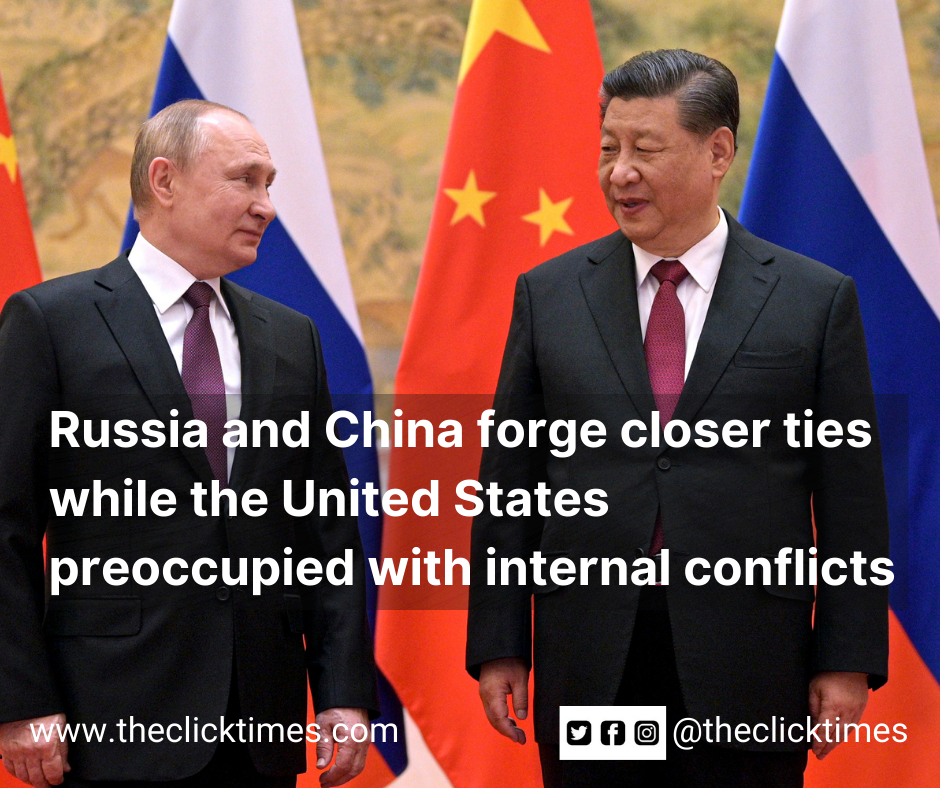One defied diplomatic boycotts over its human rights record and welcomed the world to its first Winter Olympics. The other rallied troops on his neighbor’s border and made demands on the United States and its allies.
Chinese President Xi Jinping and Russian President Vladimir Putin stood side by side at the opening ceremony of the Beijing Winter Olympics in February. Their joint appearance was not only the most direct demonstration of Chinese-Russian unity in decades, but also the clearest sign for observers that the two want to create a new world order. – one in which America’s post-war global hegemony is on the wane and autocratic regimes can thrive in the space left behind.
“They see this as a post-Trump world where the Americans pulled out of Afghanistan in disarray, they can’t seem to deter the Russians and they can’t even deal with Covid,” said Steve Tsang, director of the China Institute at SOAS University London. “So maybe it’s not entirely stupid and wrong when they say ‘The East rises and the West falls’.”
In the face of the worldwide retreat of democracy, the resolve of Russia and China has been particularly strengthened by the perception that U.S. is moving away from the global stage, and the erosion of their own values at home, he said. This has created, in the eyes of some in Beijing and Moscow, a vacuum that the two countries are only too happy to step into.
This idea is not entirely new.
From at least 2008 predictions government officials and intellectual elites in China and Russia have been predicting or advocating the end of America’s postwar dominance.But a joint 5,000-word statement marked the first time these countries collectively expressed their vision for that “multipolar” future so comprehensively.
“A trend of redistribution of power in the world has emerged,” the statement said. This “new era” will “ensure peace, stability and sustainable development,” he added, and not “power politics” and ” US supremacy,” where “the weak fall prey to the strong.”
Crucially, ending US rule would prevent the West from attempting “to interfere in the internal affairs of other states and protect their legitimate rights and interests to hurt,” the statement said. , echoing a long-standing complaint that has been used to push back Western calls for democratic, legal and economic reforms.
Without naming names, the message was clear: Washington has neither the power nor the right , to act as the world’s police.
For China, this would mean less criticism over alleged human rights abuses against its Uyghur Muslim minority, which the U.S. and others say she faces cultural genocide, his crackdown on Hong Kong freedoms and his threats to invade Taiwan, all of which China denies.
Russia wants to silence criticism over its interference in other countries’ elections, its invasion of neighbors like Georgia and Ukraine, and its repression of political opposition and freedom of expression in the country, which it also denies.
The extent of America’s decline has been debated in Chinese power circles for years, said Kingsley Edney, who teaches Chinese politics and international relations at the University of Leeds in England. To put it so forcefully last week is “maybe a sign and that’s something that’s becoming more and more of a problem.” Consensus view within the establishment,” he said.
In fact, the rise of the East and the fall of the West has become a common refrain for Xi and his top officials, and not without evidence. China is expected to become the world’s largest economy this decade, building the equivalent of France’s navy every four years, German and French officials said.
The situation is different for Russia, which, while overweight due to its large gas reserves and nuclear arsenal, remains a mid-sized economy with a gross domestic product below Italy’s. But in China he now has a powerful partner that last week failed to meet several of his demands, including an effective ban on Ukraine’s NATO membership.
Beijing is also now Moscow’s largest trading partner, with nearly $150 billion in imports and exports last year.
Some scholars believe the world has already moved away from a “unipolar” world in which Washington’s dominance was built on what he likes to call the “rules-based order.” This value system is based, at least in theory, on democracy, human rights and international free trade.
In reality, the United States has often contradicted these ideals, from its own history of slavery and segregation to funding right-wing regime change in Latin America. But only relatively recently have foreign powers seriously challenged its economic, cultural, and military supremacy.
When the Soviet Union disintegrated in 1991, some thinkers believed the Western liberal model had prevailed forever: democracy had won a global victory and it was only a matter of time before the world’s authoritarians conformed.
“It gave the United States the ability and opportunity to do as it saw fit on the world stage,” wrote Fyodor Lukyanov, a Russian foreign policymaker who heads a panel that advises the Kremlin, last year. “There were no longer any external restrictions.

